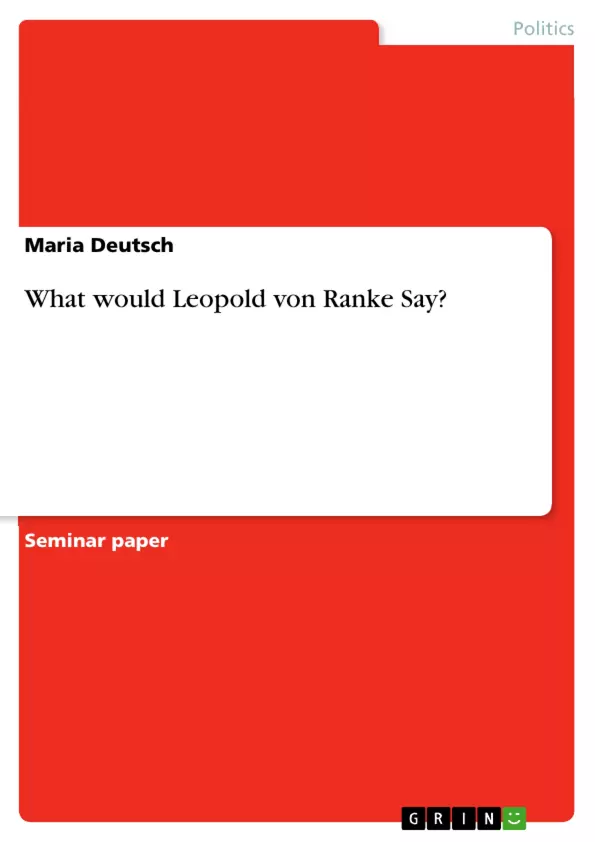This paper is based on Leopold von Ranke’s 1833 essay “The Great Powers”. Upon reading and re-reading the essay, I started to wonder what von Ranke, if he were still alive, would say about the historical developments of the latter half of the twentieth century. I wondered how he would assess the Cold War, and the increasing dominance of American culture in the world outside the United States. I was curious which countries he would see as ‘great nations’ today. In this short paper I will attempt to answer some of these questions.
Inhaltsverzeichnis (Table of Contents)
- The Great Powers
- France and Spain
- The Rise of France
- Balancing Against France
- The Rise of England
- The Rise of Austria and Russia
- The Rise of Prussia
- The Decline of France
- The French Revolution and Napoleon
- The Analogy with Literature
- The US Today
- The US as a Hegemon
- Covert Diplomacy
- The US as an Arrogant Hegemon
- The US and the Soviet Union
- Cultural Dominance
- French Culture
- Soviet Culture
- American Culture
- Cultural Influence and Power
- The Rise of Great Powers
- England
- Austria
- Russia
- Prussia
Zielsetzung und Themenschwerpunkte (Objectives and Key Themes)
This paper attempts to answer questions about the historical developments of the latter half of the twentieth century through the lens of Leopold von Ranke's 1833 essay "The Great Powers".- The parallels between France in the seventeenth and eighteenth centuries and the US in the twentieth and twenty-first centuries
- The impact of cultural influence on a country's political dominance
- The historical development of 'great nations' and the factors contributing to their rise and decline
- The role of military strength, political stability, and cultural influence in achieving and maintaining national power
- The application of historical analysis to contemporary issues in international relations
Zusammenfassung der Kapitel (Chapter Summaries)
The paper begins by summarizing von Ranke's essay "The Great Powers," focusing on the development of European powers from the sixteenth to the early nineteenth century. This section highlights the rise of France, the emergence of balancing powers like England, Austria, and Russia, and the eventual decline of French dominance. It also emphasizes the role of military strength, political stability, and cultural influence in shaping the rise and fall of European powers. The second section draws parallels between France's dominance in Europe and the US's global influence in the twentieth and twenty-first centuries. It examines the US's involvement in covert diplomacy, its perception as an arrogant hegemon, and the parallels between the US-Soviet rivalry and the earlier France-Spain rivalry. The third section delves into the significance of cultural influence on a country's political dominance. It compares French cultural dominance in Europe to the influence of Soviet culture in the Soviet Union and the broader impact of American culture on the world. The author connects cultural influence with the concept of national power, drawing on Kenneth Waltz's definition of a state's power as a combination of military strength, territorial size, natural resources, economic capacity, and political stability. The final section examines the historical cases of England, Austria, Russia, and Prussia as examples of nations that achieved "great power" status. It analyzes the factors contributing to their rise, including military strength, political stability, and cultural influence.Schlüsselwörter (Keywords)
This paper explores the concepts of national power, international relations, hegemonic power, cultural influence, historical analysis, and the comparative study of great powers. It utilizes the work of Leopold von Ranke, Kenneth Waltz, and other relevant scholars to understand the factors shaping national dominance in both historical and contemporary contexts.Frequently Asked Questions
Who was Leopold von Ranke?
Leopold von Ranke was a famous 19th-century historian known for his essay "The Great Powers" (1833), which analyzed the rise and fall of European nations.
How does this paper apply von Ranke's ideas to the modern era?
The paper uses von Ranke's lens to assess 20th-century developments, such as the Cold War and the global dominance of American culture.
What is the parallel between 18th-century France and the modern US?
The author draws parallels between France's historical dominance in Europe and the United States' global hegemonic power in the 20th and 21st centuries.
How does cultural influence affect national power?
Following von Ranke's logic, the paper argues that cultural dominance is a key factor, alongside military and economic strength, in achieving and maintaining 'great power' status.
Which countries are discussed as historical 'Great Powers'?
The paper examines the rise of England, Austria, Russia, and Prussia as examples of nations that achieved great power status through military and political stability.
- Quote paper
- Maria Deutsch (Author), 2006, What would Leopold von Ranke Say?, Munich, GRIN Verlag, https://www.grin.com/document/171806



